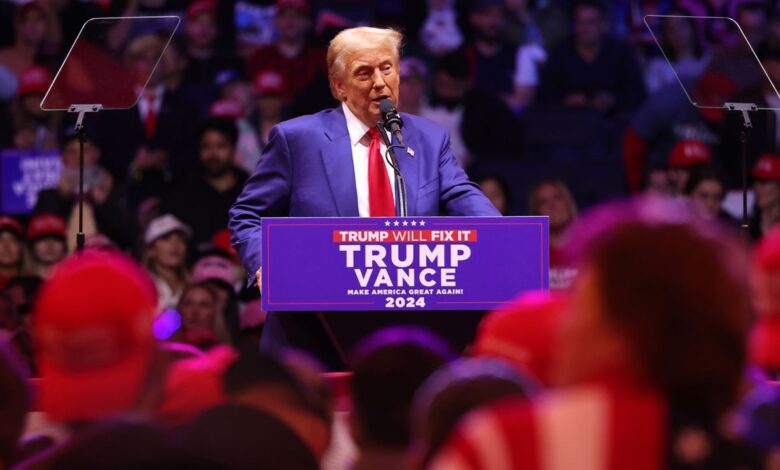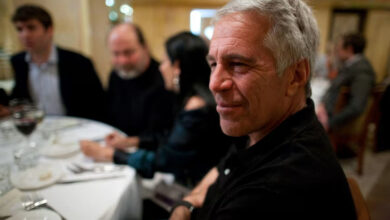
Donald Trump anchored his bid to win a second White House term next week on searing anti-migrant fear at a rally at Madison Square Garden, doubling down on his promise for a massive deportation program on Day 1 to reverse an “immigrant invasion.”
As the ex-president’s allies defend him against Democratic claims he is a “fascist” and an authoritarian in waiting, based in part on warnings by his ex-chief of staff John Kelly, Trump on Sunday delivered a screed that may augur the most extreme presidency in modern history if he beats Democratic nominee Kamala Harris on November 5.
“The United States is an occupied country,” Trump said, as Democrats projected messages on the exterior of the storied New York City arena, reading “Trump is Unhinged” and “Trump praised Hitler.”
The huge rally was billed as the launch of the final stage of Trump’s bid to pull off one of the greatest comebacks in American political history after trying to overturn the result of the last election and leaving office in disgrace in 2021. Before he spoke, some of the ex-president’s top supporters flung race-based and vulgar rhetoric. Former congressional candidate David Rem called Harris the “antichrist” and “the devil,” while others lashed out at Hillary Clinton, “illegals” and homeless people. Comedian Tony Hinchcliffe called Puerto Rico a “floating island of garbage.”
The Trump campaign later disavowed the line, with spokesperson Danielle Alvarez saying in a statement to CNN, “This joke does not reflect the views of President Trump or the campaign.”
Much of Trump’s speech brimmed with falsehoods and exaggerations. It was exactly the kind of rhetoric that the Harris campaign believes could prompt moderate voters and disaffected Republicans to choose the vice president. But it also represents a bet from the Republican nominee that he can drive out a huge base turnout and activate voters who don’t normally cast ballots but who agree with his hardline politics.
If nothing else, it clarified the choice that voters face in the coming days, as Harris promises Americans they can move on from Trump’s extreme behavior that tested the rule of law and constitutional constraints on presidents during his first term.
The ex-president’s blistering anti-migrant rhetoric ranks alongside the most flagrant demagoguery by a major figure in any Western nation since World War II. But it was also complemented by a sharp economic argument that represented the second leg of Trump’s closing pitch and targeted the frustration of many Americans who are struggling with high grocery prices despite cooling inflation.
“I’d like to begin by asking a very simple question: Are you better off now than you were four years ago?” Trump asked. “I’m here today with a message of hope for all Americans: With your vote in this election, I will end inflation. I will stop the invasion of criminals coming into our country, and I will bring back the American dream.” He also said he would push for a tax credit for “family caregivers who take care of a parent or a loved one” – after Harris unveiled her own platform proposing that Medicare cover home health care.
“If Kamala Harris gets four more years, our economy can never recover. If I win, we will quickly build the greatest economy in the history of world,” he said.
The former president rooted his first presidential campaign in 2016 on inflammatory rhetoric about Mexican migrants. Eight years later, he is suggesting that migrants are directly to blame for citizens’ economic frustrations, in a conceit that has been used by far-right leaders throughout history.
A nation on edge
Trump’s dark appearance cranked up the palpable sense of tension blanketing the country a week before an election that may represent a national turning point. Supporters of each candidate harbor a sense of dread about what happens if their nominee loses, in a showdown that has highlighted two irreconcilable visions of the future — and what it means to be an American. The warnings from Trump that he envisages a presidency of all but unchecked power dedicated to “retribution” are bolstering a sense that a fateful moment is at hand.
Democratic vice presidential nominee Tim Walz drew an allusion between Trump’s downtown Manhattan rally and a notorious 1939 pro-Nazi gathering at the previous arena on the same site, as Democrats now openly brand the ex-president as a “fascist.” The Minnesota governor said: “There’s a direct parallel to a big rally that happened in the mid-1930s at Madison Square Garden … and don’t think that he doesn’t know for one second exactly what they’re doing there.”
Sunday’s raucous event underscored how the 2024 presidential election is breaking the mold, since Trump is unlikely to be competitive in the state of New York next week. But the ex-president’s homecoming to a city where he built skyscrapers to reflect his outsize persona showed how candidates have sought headlines far from battleground states. Harris was in red-state Texas on Friday to highlight hardline GOP abortion policies she warns could spread countrywide if Trump wins. And on Tuesday, she’s holding an event in Washington, DC.
Both candidates are plunging into the final week of the campaign with polls showing a tied-up race in the swing states and nationally. The election is already underway, with 40 million Americans having voted early in person or by mail. The CNN Poll of Polls shows no clear leader nationally with Harris at 48% and Trump at 47%. The race will be decided across battlegrounds including the “blue wall” states of Pennsylvania, Michigan and Wisconsin, as well as the Sun Belt states of North Carolina, Georgia, Arizona and Nevada. The result could hinge on mere tens of thousands of votes, potentially setting the stage for tense counts over several days that will only fuel fears of a disputed election.
Harris plans her own closing argument — for a symbolic spot on Tuesday
Early voting explains why Harris will make her closing argument a full week ahead of Election Day, with a rally Tuesday evening on the Ellipse in Washington. The symbolism will be acute since it’s the site of Trump’s infamous gathering on January 6, 2021, when he told his crowd to “fight like hell” or they wouldn’t have a country before his mob smashed into the US Capitol to try to subvert the certification of President Joe Biden’s election victory. Harris’ rally will provide an emphatic exclamation point for an increasingly important theme of her campaign — that Trump represents an existential threat to American democracy.
That message was at the center of Biden’s campaign until he folded his reelection bid in July. Harris didn’t prioritize the same theme initially, but she’s increasingly warming to it. But some Democrats worry that the American people are more interested in how she can quickly improve their economic circumstances. “How effective is attacking Trump for being a fascist? This topic is not as persuasive as contrast messages featuring Harris’s economic plans, and her promise to protect reproductive rights,” read an October 25 email from Future Forward, the top super PAC supporting the Harris campaign, sent to Democrats that was first reported by The New York Times and obtained by CNN on Sunday.
Trump has in recent days played into claims by Democrats and Kelly that he is an aspiring authoritarian.
That left GOP vice presidential nominee, Ohio Sen. JD Vance, seeking to cherry-pick and redefine the ex-president’s on-the-record comments and blaming the media for reporting exactly what his boss has said. Vance insisted in a fiery interview with CNN’s Jake Tapper on “State of the Union” on Sunday that ex-president had not been referring to political opponents when he openly considered turning the military and the National Guard on the “enemy from within.” Trump, however, had however previously clarified he was talking about people such as former House Speaker Nancy Pelosi and California Rep. Adam Schiff.
“He said that he wanted to use the military to go after far-left lunatics who are rioting, and … he also called them ‘the enemy within.’ He separately, in a totally different context, in a totally different conversation, said that Nancy Pelosi and Adam Schiff were threats to this country,” Vance said.
Both Trump and Harris are targeting strategic sectors of their core electorates in the final days. Harris, for instance, on Sunday made a fresh attempt to win over Black male voters, some of whom seem to be moving toward Trump. At a barber shop in West Philadelphia, an area where she needs big turnout to counter Trump’s advantage in rural Pennsylvania, the vice president took part in a discussion with Black men focused on providing better opportunities. And she underscored the vital nature of the commonwealth and its 19 electoral votes — which could block her path to the White House if it goes for Trump, as it did during his 2016 election triumph.
“We’re going to do it — victory runs through Philly and it runs through Pennsylvania,” Harris said.
The vice president is also targeting another constituency that could help her to the White House — women voters, as she tries to harness the already significant gender gap to her advantage. She appeared in Michigan on Saturday with Michelle Obama — a reluctant political figure who nevertheless is hugely popular among Democrats. In a powerful speech, the former first lady did not just appeal to women, but to the “the men who love us” — warning that Trump’s history of building the conservative Supreme Court that overturned the federal right to an abortion would have grave implications for women’s health.
“Please, please do not hand our fates over to the likes of Trump, who knows nothing about us, who has shown deep contempt for us,” Obama said. “Because a vote for him is a vote against us, against our health, against our worth.”




